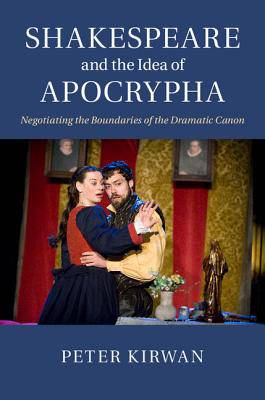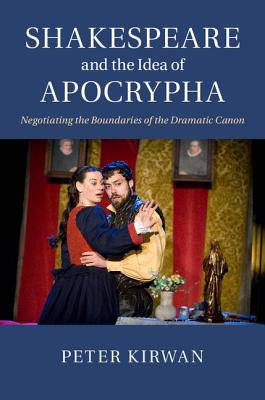
Bedankt voor het vertrouwen het afgelopen jaar! Om jou te bedanken bieden we GRATIS verzending (in België) aan op alles gedurende de hele maand januari.
- Afhalen na 1 uur in een winkel met voorraad
- In januari gratis thuislevering in België
- Ruim aanbod met 7 miljoen producten
Bedankt voor het vertrouwen het afgelopen jaar! Om jou te bedanken bieden we GRATIS verzending (in België) aan op alles gedurende de hele maand januari.
- Afhalen na 1 uur in een winkel met voorraad
- In januari gratis thuislevering in België
- Ruim aanbod met 7 miljoen producten
Zoeken
Shakespeare and the Idea of Apocrypha
Negotiating the Boundaries of the Dramatic Canon
Peter Kirwan
Hardcover | Engels
€ 183,45
+ 366 punten
Uitvoering
Omschrijving
In addition to the thirty-six plays of the First Folio, some eighty plays have been attributed in whole or part to William Shakespeare, yet most are rarely read, performed or discussed. This book, the first to confront the implications of the 'Shakespeare Apocrypha', asks how and why these plays have historically been excluded from the canon. Innovatively combining approaches from book history, theatre history, attribution studies and canon theory, Peter Kirwan unveils the historical assumptions and principles that shaped the construction of the Shakespeare canon. Case studies treat plays such as Sir Thomas More, Edward III, Arden of Faversham, Mucedorus, Double Falsehood and A Yorkshire Tragedy, showing how the plays' contested 'Shakespearean' status has shaped their fortunes. Kirwan's book rethinks the impact of authorial canons on the treatment of anonymous and disputed plays.
Specificaties
Betrokkenen
- Auteur(s):
- Uitgeverij:
Inhoud
- Aantal bladzijden:
- 272
- Taal:
- Engels
Eigenschappen
- Productcode (EAN):
- 9781107096172
- Verschijningsdatum:
- 16/04/2015
- Uitvoering:
- Hardcover
- Formaat:
- Genaaid
- Afmetingen:
- 152 mm x 229 mm
- Gewicht:
- 566 g

Alleen bij Standaard Boekhandel
+ 366 punten op je klantenkaart van Standaard Boekhandel
Beoordelingen
We publiceren alleen reviews die voldoen aan de voorwaarden voor reviews. Bekijk onze voorwaarden voor reviews.









